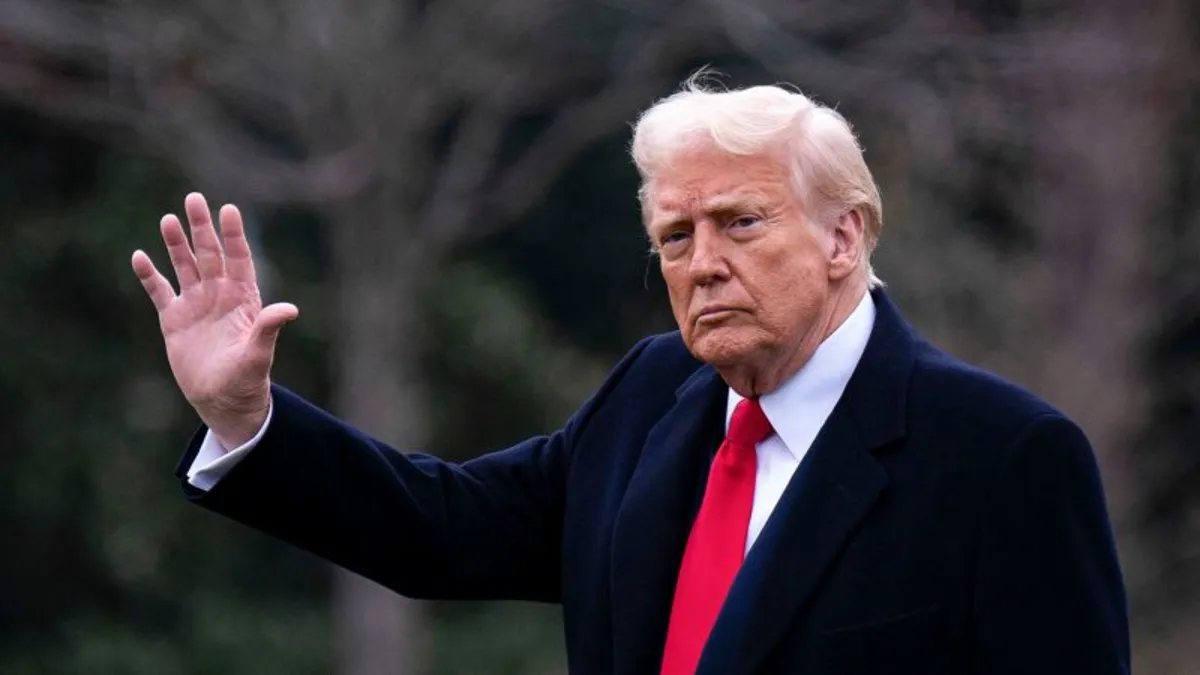
The White House has firmly denied allegations that it violated a judge’s order to halt the deportation of alleged Venezuelan gang members to El Salvador. This situation raises significant legal concerns regarding the administration's claims of expansive presidential authority, potentially pushing the nation closer to a constitutional crisis. The controversy centers around Venezuelan migrants who were expelled under the rare application of the Alien Enemies Act, a law dating back to the 18th century. This decision has been met with criticism, as many view it as an overreach by President Donald Trump.
U.S. District Judge James Boasberg issued a temporary block on the deportations to assess the implications of utilizing the Alien Enemies Act. He directed that any planes already en route with deportees should return to U.S. soil. However, the administration announced on Sunday that 250 deportees, purportedly linked to the Tren de Aragua gang, had already been transferred to custody in El Salvador. The nuanced statement from White House Press Secretary Karoline Leavitt on Sunday evening heightened speculation around whether officials had disregarded the judge's ruling.
Leavitt clarified, “The Administration did not ‘refuse to comply’ with a court order. The order, which had no lawful basis, was issued after terrorist (Tren de Aragua) aliens had already been removed from U.S. territory.” She further stated, “A single judge in a single city cannot direct the movements of an aircraft carrier full of foreign alien terrorists who were physically expelled from U.S. soil.” However, this characterization raises confusion, as the White House does not possess the authority to determine the legality of court orders.
The precise timing of Judge Boasberg’s orders and their relation to the deportation operations remains unclear. If the administration did defy the judge’s ruling, it could lead to a significant legal crisis, intensifying concerns about an authoritarian presidency that openly contradicts the rule of law. Trump’s current approach exhibits a trend of asserting substantial power, compelling courts and political opponents to react after his actions have already initiated irreversible changes.
The invocation of the Alien Enemies Act to expedite deportations is particularly alarming, as it was originally intended for wartime use. The recent crackdown on student protests, highlighted by the detention of a Palestinian green card holder, is being justified by the administration on the grounds that his anti-Israel sentiments threaten U.S. foreign policy interests. Critics argue that this illustrates an attempt to suppress First Amendment rights and dissent within educational settings.
Trump’s abrupt termination of the taxpayer-funded international broadcasting service, Voice of America, over the weekend reignited debates about his unilateral authority to ignore congressional appropriations. Millions of voters supported Trump’s leadership, believing he would dismantle institutions that they felt did not align with their cultural and material values. Polls indicate that among his followers, his assertive actions are viewed favorably.
However, the legality of deporting individuals under the Alien Enemies Act raises critical questions. The law allows for its invocation during wartime or in response to threats against U.S. territory. Yet, the United States is not currently engaged in a war with Venezuela, and while Trump has often claimed an “invasion” by undocumented migrants and gang members, Congress retains the constitutional authority to declare war. This raises significant questions about whether the administration has overstepped its legal boundaries.
Boasberg’s temporary restraining order was intended to allow for important legal discussions to unfold. South Dakota Republican Senator Mike Rounds emphasized the necessity for the executive branch to adhere to the law, stating, “We expect the executive branch to follow the law. We are a constitutional republic, and we will follow those laws.” Meanwhile, Secretary of State Marco Rubio confirmed via social media that over 250 alleged members of the Tren de Aragua gang had been transferred to El Salvador, with the U.S. government covering $6 million for their imprisonment.
The timing of the deportations in relation to the court orders is now under scrutiny. Boasberg initially blocked the deportation of five individuals involved in a legal challenge but later expanded his order to include all noncitizens in U.S. custody under Trump’s proclamation. The Department of Justice (DOJ) argued that deportations occurred between the two orders, although the five initial plaintiffs were not removed.
Beyond the legal implications, the deportations to El Salvador raise significant concerns under international law, which typically prohibits sending individuals to countries where they may face persecution. The harsh conditions faced by inmates in El Salvador could meet this threshold, and President Nayib Bukele's government has been criticized for its constitutional and human rights violations. Additionally, the administration's lack of transparency regarding the identities of those deported raises alarms that individuals who are not gang members could be unjustly swept up in these actions.
The administration is also facing scrutiny over the detention of Mahmoud Khalil, a Palestinian refugee whose green card was revoked after his participation in protests against the Israel-Hamas war. Supporters argue that Khalil is being targeted for exercising his First Amendment rights, while Rubio contends that his past activities disqualified him from U.S. residency. This situation underscores the significant implications for immigrants and their rights in the U.S., with fears that the government could arbitrarily label dissenters as threats to national interests.
Khalil's case remains in litigation, with a federal judge blocking his deportation. Like the deportations of alleged gang members, this case is likely to ascend to the Supreme Court, raising questions about the extent of Trump’s authority. The administration’s aggressive maneuvers may redefine American governance, values, and culture, creating challenges that future presidents and Congresses may struggle to reverse.